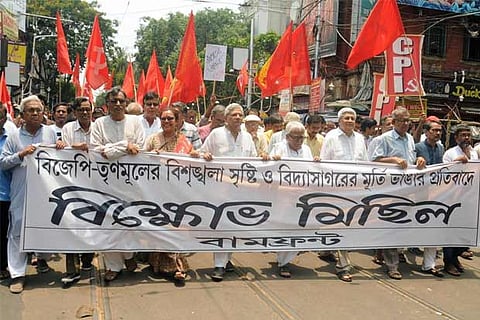

New Delhi
The Delhi state organising committee of SUCI (Communist) staged a protest at Jantar Mantar and demanded immediate arrest of the culprits involved in vandalising the bust.
Shouting anti-BJP and anti-RSS slogans, the protesters said the bust of Vidyasagar, instrumental in bringing the Hindu Widows' Remarriage Act in 1856, was demolished at a time when the entire country is preparing to celebrate his 200th birth anniversary.
"The demolition of the statue of the great Vidyasagar should not be mistaken as just a part of electoral violence, but it is a well-planned conspiracy to muzzle the secular and scientific thinking," K C Tiwari, a member of SUCI (Communist), said.
Kolkata witnessed widespread violence during BJP president Amit Shah's road show Tuesday. A bust of Vidyasagar was vandalised during the violence. This also led to a blame-game between the BJP and the Trinamool Congress over who was behind the act.
Another protest took place in Chittaranjan Park, known as the Bengali hub in Delhi.
Anup Tagore, who participated in the protest, said nearly 100-150 people participated in the march from Market No. 1 to Market No. 2 of Chittaranjan Park.
"Vidyasagar is a Bengali icon. He was a scholar and a social reformer and we all felt that his name should not be dragged into politics. We also demand strict action against those who vandalised his statue.
Aam Aadmi Party volunteers also joined the protest at Chittaranjan Park.
Local MLA and AAP spokesperson Saurabh Bhardwaj, who participated in the protest, said, "What is happening in West Bengal is extremely serious and shows our democracy is in danger."
Born as Ishwarchandra Bandyopadhyay in 1820, he earned the title 'vidyasagar' -- the 'ocean of knowledge' for a good reason. He brought the magic of William Shakespeare alive in Bengali by translating a number of the bard's dramas as well as a number of Sanskrit classics.
He simplified Bengali typography and interpreted complex notions of Sanskrit grammar in easy legible Bengali language.
Besides his work in the field of education, he was a powerful voice against oppression of women in 19th century Bengal.
Vidyasagar opened a school for women and was instrumental in bringing the Hindu Widows' Remarriage Act in 1856, for which he endured the wrath of conservative Hindus.
Visit news.dtnext.in to explore our interactive epaper!
Download the DT Next app for more exciting features!
Click here for iOS
Click here for Android